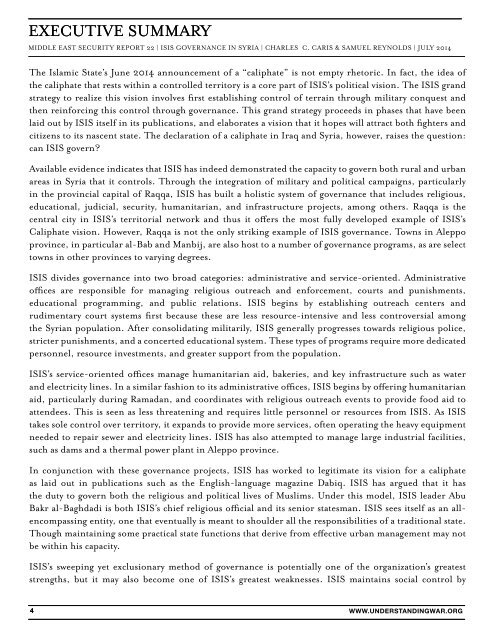ISIS_Governance
ISIS_Governance
ISIS_Governance
Create successful ePaper yourself
Turn your PDF publications into a flip-book with our unique Google optimized e-Paper software.
Executive Summary<br />
Middle East Security Report 22 | <strong>ISIS</strong> <strong>Governance</strong> in Syria | Charles C. Caris & Samuel reynolds | july 2014<br />
The Islamic State’s June 2014 announcement of a “caliphate” is not empty rhetoric. In fact, the idea of<br />
the caliphate that rests within a controlled territory is a core part of <strong>ISIS</strong>’s political vision. The <strong>ISIS</strong> grand<br />
strategy to realize this vision involves first establishing control of terrain through military conquest and<br />
then reinforcing this control through governance. This grand strategy proceeds in phases that have been<br />
laid out by <strong>ISIS</strong> itself in its publications, and elaborates a vision that it hopes will attract both fighters and<br />
citizens to its nascent state. The declaration of a caliphate in Iraq and Syria, however, raises the question:<br />
can <strong>ISIS</strong> govern?<br />
Available evidence indicates that <strong>ISIS</strong> has indeed demonstrated the capacity to govern both rural and urban<br />
areas in Syria that it controls. Through the integration of military and political campaigns, particularly<br />
in the provincial capital of Raqqa, <strong>ISIS</strong> has built a holistic system of governance that includes religious,<br />
educational, judicial, security, humanitarian, and infrastructure projects, among others. Raqqa is the<br />
central city in <strong>ISIS</strong>’s territorial network and thus it offers the most fully developed example of <strong>ISIS</strong>’s<br />
Caliphate vision. However, Raqqa is not the only striking example of <strong>ISIS</strong> governance. Towns in Aleppo<br />
province, in particular al-Bab and Manbij, are also host to a number of governance programs, as are select<br />
towns in other provinces to varying degrees.<br />
<strong>ISIS</strong> divides governance into two broad categories: administrative and service-oriented. Administrative<br />
offices are responsible for managing religious outreach and enforcement, courts and punishments,<br />
educational programming, and public relations. <strong>ISIS</strong> begins by establishing outreach centers and<br />
rudimentary court systems first because these are less resource-intensive and less controversial among<br />
the Syrian population. After consolidating militarily, <strong>ISIS</strong> generally progresses towards religious police,<br />
stricter punishments, and a concerted educational system. These types of programs require more dedicated<br />
personnel, resource investments, and greater support from the population.<br />
<strong>ISIS</strong>’s service-oriented offices manage humanitarian aid, bakeries, and key infrastructure such as water<br />
and electricity lines. In a similar fashion to its administrative offices, <strong>ISIS</strong> begins by offering humanitarian<br />
aid, particularly during Ramadan, and coordinates with religious outreach events to provide food aid to<br />
attendees. This is seen as less threatening and requires little personnel or resources from <strong>ISIS</strong>. As <strong>ISIS</strong><br />
takes sole control over territory, it expands to provide more services, often operating the heavy equipment<br />
needed to repair sewer and electricity lines. <strong>ISIS</strong> has also attempted to manage large industrial facilities,<br />
such as dams and a thermal power plant in Aleppo province.<br />
In conjunction with these governance projects, <strong>ISIS</strong> has worked to legitimate its vision for a caliphate<br />
as laid out in publications such as the English-language magazine Dabiq. <strong>ISIS</strong> has argued that it has<br />
the duty to govern both the religious and political lives of Muslims. Under this model, <strong>ISIS</strong> leader Abu<br />
Bakr al-Baghdadi is both <strong>ISIS</strong>’s chief religious official and its senior statesman. <strong>ISIS</strong> sees itself as an allencompassing<br />
entity, one that eventually is meant to shoulder all the responsibilities of a traditional state.<br />
Though maintaining some practical state functions that derive from effective urban management may not<br />
be within his capacity.<br />
<strong>ISIS</strong>’s sweeping yet exclusionary method of governance is potentially one of the organization’s greatest<br />
strengths, but it may also become one of <strong>ISIS</strong>’s greatest weaknesses. <strong>ISIS</strong> maintains social control by<br />
4<br />
www.Understandingwar.org


